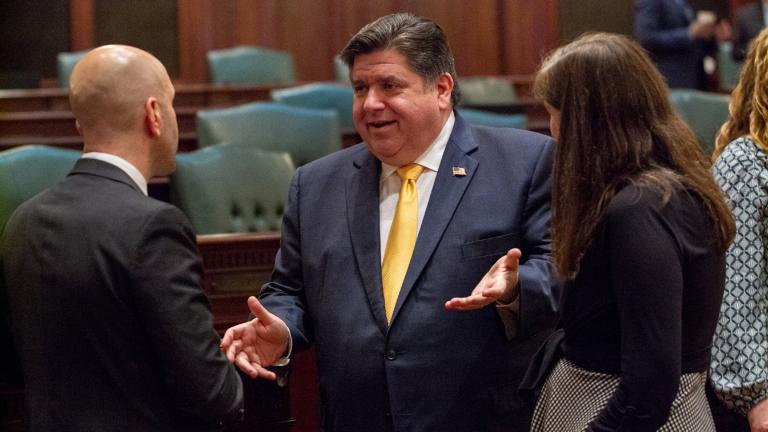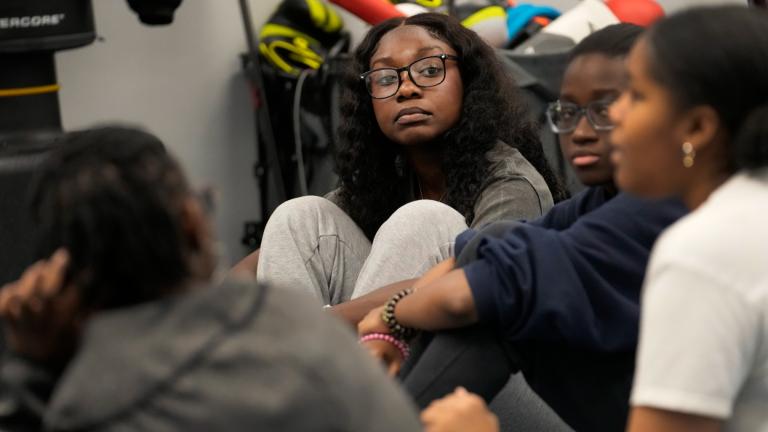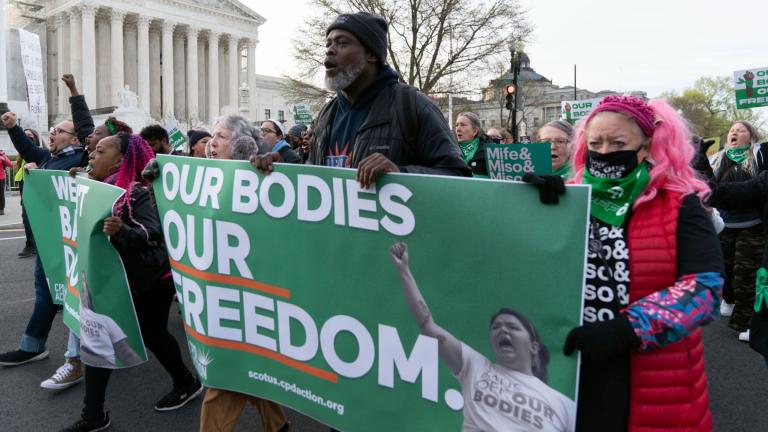Eighty-three days after the United States Supreme Court overturned Roe v. Wade, Illinois is now an island of abortion access for people throughout the Midwest and South.
The near-total ban on abortion that took effect Thursday in Indiana will force more people to travel to already-overwhelmed Illinois clinics for reproductive health care and seek help from groups that have already reached their capacity, reproductive health care advocates told WTTW News.
“Illinois has long been a regional access point for folks,” said Alicia Hurtado, communications and advocacy manager at the Chicago Abortion Fund. “At this point, we are a national access point.”
Planned Parenthood of Illinois marked the start of the ban on abortion in Indiana by announcing that the group’s health center in Champaign will double in size and capacity. Approximately 11% of the patients seen there traveled from Indiana — a number that will certainly increase, officials said.
“Indiana’s draconian abortion ban does not stop people from having abortions, it only makes it more difficult for people to access abortion in a safe and timely manner,” said Planned Parenthood of Illinois CEO Jennifer Welch.
Growing Need, Rising Expenses
In January, the Chicago Abortion Fund spent approximately $18,000 a week helping people get abortions and cover travel expenses. Now, the nonprofit group is spending between $40,000 and $45,000 per week to help many more people, Hurtado said.
“We know that abortion access exists in an ecosystem,” said Hurtado, who estimated that 20% of the calls to the group’s help line come from Indiana. “When one state falls it doesn’t just impact folks in that state, it’s impacting all of us.”
So far, the donation-reliant Chicago Abortion Fund has not turned anyone away — but it is not clear that the group has the capacity to handle the increase that Indiana’s ban will trigger, Hurtado said.
“We’re all concerned. We’ve been concerned for quite some time,” Hurtado said. “We know that with this Indiana ban coming down, that we are going to see many more Hoosiers coming to Illinois.”
Before this week, the Midwest Access Coalition had never turned away someone seeking help to travel to Illinois to get an abortion but could not afford to, said Alison Dreith, the coalition’s director of strategic partnerships. But with double the number of people now asking for help, that is no longer possible, she added.
“What we were doing was really at an unsustainable rate,” Dreith said, calling the decision heartbreaking. “A lot of crying was involved. This was a decision a long time coming.”
In all of 2021, the coalition helped 800 people. As of Sept. 2 of this year, the coalition had already helped 1,050 people, Dreith said.
The price of flights has soared along with the cost of hotel rooms, as travel returned to pre-pandemic levels, stretching the group’s budget beyond the breaking point after it had been strained for months by rising prices and by the decision by the U.S. Supreme Court in March to uphold additional restrictions on abortions in Texas, Dreith said.
The group will now cap the assistance it can offer to people seeking help at $1,000, Dreith said. That would not have been enough to help a woman from rural Arkansas, who needed $2,500 to get to Illinois and get the care she needed, Dreith said.
Illinois has long been a haven for people from Indiana seeking reproductive health care, since the state prohibited abortions after the 14th week of pregnancy and required a 24-hour waiting period even before the ban went into effect, Dreith said.
“Access is just eroding,” Dreith said. “The fact of the matter is nobody should have to travel out of their community to get basic reproductive health care.”
Even though the group saw a surge in donations after the Supreme Court overturned Roe v. Wade, the group does not have enough volunteers to help everyone who needs assistance.
“We are in a crisis moment,” Dreith said.
That crisis is especially acute in Southern Illinois, which is now a peninsula of abortion access surrounded by states that already have a full ban in place, including Missouri, Kentucky, Tennessee and now Indiana.
Even though officials with the Planned Parenthood of the St. Louis Region and Southwest Missouri had been preparing for months for the Supreme Court to overturn the constitutional right to an abortion were overwhelmed by the cascade of demand for reproductive health care, said Bonyen Lee-Gilmore, the vice president of communications and strategy.
“Since Roe fell, we have seen an uptick in a surge of patients faster than we could have anticipated,” Lee-Gilmore said.
Efforts to plan for a worst-case scenario were unsuccessful, with demand outpacing capacity, Lee-Gilmore said.
Since the Supreme Court decision The number of abortions performed at 14 weeks or later has increased 114%, an indication that people seeking abortions have had to wait longer to get the care they need because they now have to travel long distances and face long wait times, Lee Gilmore said.
People are now waiting between two and a half weeks and three weeks to get an abortion, Lee Gilmore said. Before Roe was overturned, the wait time was no more than three days, she added.
“We are getting inundated,” Lee-Gilmore said, adding that has made it harder for Illinois residents to get the care they need — even though state leaders have vowed to protect abortion access in Illinois.
That “ripple effect” — causing patients to be displaced throughout Illinois — will just get worse, now that Indiana has a near-total ban in place, Lee-Gilmore said.
“When Indiana falls, we will see an influx of patients,” Lee-Gilmore said. “Illinois is an island.”
Thwarted Special Session
Hours after the Supreme Court overturned the federal constitutional right to an abortion, Gov. J.B. Pritzker reacted with fury — and called a special session of the General Assembly to take “swift action” in the “coming weeks.”
That special session was expected to give lawmakers a chance to pass bills designed to strengthen protections for abortion care, and to provide resources for people traveling to Illinois from states that have banned abortion.
Lawmakers were also expected to reconsider bill that passed the Illinois House but not the Senate during the spring session that prevents state officials from disciplining doctors and nurses for providing abortion care to ensure there are enough health care professionals to handle the coming wave.
Abortion funds need sustained funding from state and local governments to ensure access to abortion in Illinois, Hurtado said.
But shortly after the Fourth of July holiday, the special session had been delayed over questions over what measures lawmakers could pass without any Republican votes — and withstand likely court challenges.
The next opportunity for the Illinois House and Senate to act will be the Veto Session, set to start one week after the Nov. 8 general election.
“It is a delicate balance between having the right sense of urgency with also getting the policies right,” Lee-Gilmore said, calling on Illinois lawmakers to provide funding to groups that help people access abortion care and allow nurse practitioners and physicians assistants to perform abortions.
“Do we wish that something could have happened months ago?” Lee-Gilmore said. “Absolutely. We needed this long before Roe fell.”
Ordinance Set for Passage
While state lawmakers won’t act on abortion-related proposals until November at the earliest, the Chicago City Council is set to approve a measure on Wednesday to permanently ban Chicago Police and other officials from cooperating with probes into those who travel to the city for abortions or their doctors.
The measure, known as the “Bodily Autonomy Sanctuary City Ordinance,” would ratify and expand an executive order signed by Mayor Lori Lightfoot in July after the Supreme Court decision to overturn Roe v. Wade.
Contact Heather Cherone: @HeatherCherone | (773) 569-1863 | [email protected]








